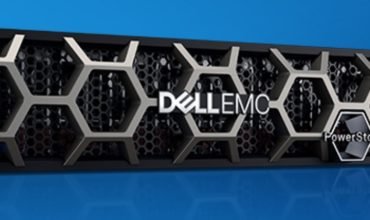Dell Technologies introduces Dell EMC PowerScale, a new family of storage systems to capture and capitalize on unstructured data, such as documents, images, videos, and social media content. Dell EMC PowerScale runs on the next generation of OneFS.
 The PowerScale family features new 1U PowerEdge-based PowerScale all-flash and NVMe nodes and existing Isilon all-flash, hybrid and archive nodes running the PowerScale OneFS 9.0 operating system.
The PowerScale family features new 1U PowerEdge-based PowerScale all-flash and NVMe nodes and existing Isilon all-flash, hybrid and archive nodes running the PowerScale OneFS 9.0 operating system.
The PowerScale family delivers up to 15.8 million IOPS per cluster, offering the performance that customers need to handle demanding AI, analytics, IOT, digital media, healthcare and life sciences workloads. The new all-flash PowerScale F200 nodes bring up to five times more performance than its predecessor. Enhanced inline data reduction makes the platform up to six times more efficient.
PowerScale can start small and grow to massive, petabyte-scale while remaining simple and easy-to-use: Scale without disruption, Intelligent automation, Resilient and efficient, Programmable infrastructure.
Dell Technologies makes it easy for customers to understand their data and storage infrastructure health through software included with PowerScale:
- Put data to work: The introduction of Dell EMC DataIQ software helps companies extract business value from unstructured data, typically uncategorized and found in siloes throughout businesses. DataIQ breaks down data siloes by delivering a single view of file and object data across Dell EMC, third-party and public cloud storage. Users can gain better control over their data, ensure the right teams have access to it and make the most of their investment by ensuring data is stored on the right tier within their storage environment.
- Proactive health monitoring: Dell EMC CloudIQ infrastructure monitoring and analytics software combines machine learning and human intelligence to provide customers with real-time performance and capacity analysis as well as historical tracking for a single view of Dell EMC infrastructure.
Any data, anywhere
PowerScale supports a wide variety of file protocols and customers can easily deploy it to meet their infrastructure needs:
- Any application: PowerScale OneFS 9.0 features broad multiprotocol support, including new S3 support for modern apps relying on object storage. Additional support for protocols including NFS, SMB and HDFS, allow customers to run a large number of traditional and modern applications without compatibility concerns.
- Deployment flexibility: PowerScale is easily deployed in core data centers, in edge locations or as part of a multi-cloud strategy. The compact 1U footprint and minimum cluster size of new all-flash F200 and NVMe F600 PowerScale nodes make it an ideal option for edge deployments.
- Multi-cloud support: PowerScale for Multi-cloud can directly connect to all major public clouds as a managed service – ideal for customers looking to move or deploy demanding apps in the cloud. Google Cloud customers looking to save time and management complexity can choose Dell Technologies Cloud PowerScale for Google Cloud, a native cloud service that combines the performance, scale, and consistent experience of PowerScale with the economics and simplicity of Google Cloud.
With Dell Technologies On-Demand, PowerScale customers can respond to workload spikes and new service requests with elastic capacity and cloud economics. Several flexible pay-per-use choices with short-and-long term commitment options are available, including a one year term for flexible consumption.



